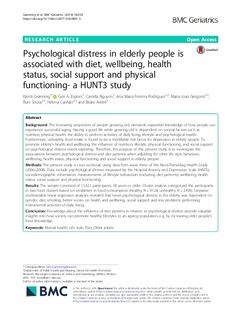| dc.description.abstract | Background
The increasing proportion of people growing old, demands expanded knowledge of how people can experience successful aging. Having a good life while growing old is dependent on several factors such as nutrition, physical health, the ability to perform activities of daily living, lifestyle and psychological health. Furthermore, unhealthy food intake is found to be a modifiable risk factor for depression in elderly people. To promote elderly’s health and wellbeing, the influence of nutrition, lifestyle, physical functioning, and social support on psychological distress needs exploring. Therefore, the purpose of this present study is to investigate the associations between psychological distress and diet patterns when adjusting for other life style behaviors, wellbeing, health status, physical functioning and social support in elderly people.
Methods
The present study is cross sectional, using data from wave three of the Nord-Trøndelag Health Study (2006–2008). Data include psychological distress measured by the Hospital Anxiety and Depression Scale (HADS), sociodemographic information, measurements of lifestyle behaviours (including diet patterns), wellbeing, health status, social support and physical functioning.
Results
The sample consisted of 11,621 participants, 65 years or older. Cluster analysis categorized the participants in two food clusters based on similarities in food consumption (healthy N = 9128, unhealthy N = 2493). Stepwise multivariable linear regression analyses revealed that lesser psychological distress in the elderly was dependent on gender, diet, smoking, better scores on health and wellbeing, social support and less problems performing instrumental activities of daily living.
Conclusion
Knowledge about the influence of diet patterns in relation to psychological distress provide valuable insights into how society can promote healthy lifestyles to an ageing population, e.g. by increasing older people’s food knowledge. | nb_NO |

